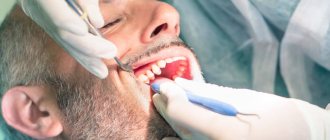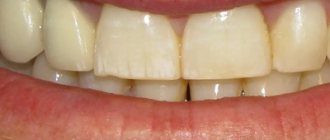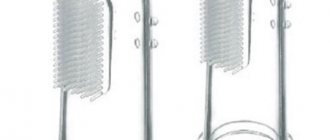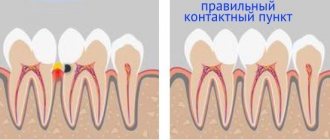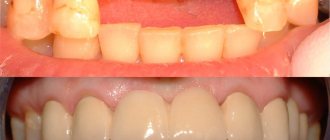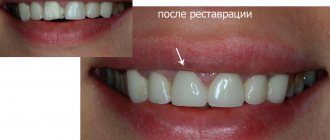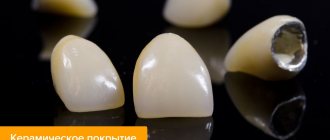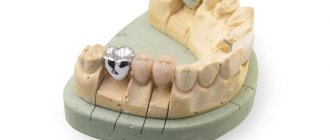Today, metal-ceramics is considered one of the most popular materials for prosthetics in dentistry. Its main advantages are high strength and durability, decent aesthetics and affordable cost. However, in order for prosthetics to be truly durable and reliable, the patient should know how to properly care for metal-ceramic teeth and carry out such care regularly.
Rules for caring for metal-ceramic teeth
Despite the fact that caring for metal-ceramic teeth is quite simple and does not require any special effort, it should be done daily, regularly and carefully - only in this case the patient can be sure that the structures will last a long time and will not cause problems. The basic rules of care are:
- You should brush your teeth at least twice a day, using vertical sweeping movements in the direction from the gums to the cutting edge of the teeth.
- It is better to use a brush with soft bristles that will not injure your gums. You can use the most ordinary toothpaste, but in cases where most of the dentition in the mouth is replaced by dentures, it is better to choose toothpastes that care for the gums (containing herbal extracts or propolis).
- You can’t limit yourself to just cleaning, since you need to care for metal-ceramic crowns just as carefully as you take care of your “natural” teeth, so after each cleaning, the interdental spaces are cleaned with dental floss.
- After cleaning, you should rinse your mouth thoroughly - first with water, and then with an antiseptic solution, which the dentist will recommend.
- If a person smokes, often drinks coffee or other staining and plaque-creating drinks and products, it is necessary to regularly carry out hygienic cleaning at the dentist, since caring for metal ceramics only at home will clearly not be enough. Whitening pastes do not affect artificial teeth and therefore will not give any effect.
Dentists recommend that patients who have metal-ceramic bridge structures installed do not forget to thoroughly clean the rinsing channel located between the crown and the gum during hygiene procedures - if this is not done, food debris will accumulate and gradually decompose in the channel, and bad breath will appear .
Hygiene products for cleaning implants, crowns, dental bridges
To clean fixed dentures you will need the following hygiene products:
. The cleaning brush should have an appropriate degree of bristles so as not to scratch the denture or wear it off. In addition to the main one, you will need a special mono-beam, narrow and thin - for cleaning interdental spaces and difficult places that are inaccessible to a regular brush. It is used after basic brushing; toothpaste is not required for such a cheek.
Toothbrush- Toothpaste . Dentists do not have any special requirements for the paste; you can use a regular one that is suitable for your situation. It is worth noting that whitening pastes or enamel strengthening pastes will not be as effective if you have a lot of fillings, crowns or implants in your mouth. When choosing, dentists recommend giving preference to pastes that have an effect not on the teeth, but on the gums. If you have gum disease or increased plaque formation, you can use pastes with antiseptic properties or herbal extracts.
- Floss . Cleaning the dentures in the area adjacent to the gums is an extremely important step in cleaning. Dental floss will help cope with plaque; for this, there are two types of floss - flat for narrow spaces between teeth, round for wider areas. It is advisable to floss after every meal to remove food particles that get stuck while eating.
- Irrigators and rinses . The irrigator effectively removes bacteria not only from teeth and gums, but also from the tongue. The irrigator can be refilled with both plain water and rinse aid, but it cannot be used during exacerbation of chronic oral diseases. Rinses are prescribed by the dentist if necessary. Consult your doctor before use, especially if you decide to purchase a product with antiseptic or antibacterial properties. Rinsers and irrigators cannot replace full hygiene with a brush and dental floss, so use them after basic procedures.
Caring for fixed dentures is important throughout their lifespan. Careful care of implants and crowns extends their service life, in some cases up to several decades. It is important to remember that in addition to home care, it is necessary to undergo regular preventive examinations, have professional cleaning, and protect dentures from chips, cracks and scratches. At the “Royal Smile” dentistry, after installing implants, crowns or dental bridges, you will receive all the recommendations for caring for them, as well as choosing a brush, paste and additional hygiene products.
How to care for metal-ceramic crowns besides cleaning?
The main misconception of patients who do not know exactly how to properly care for metal-ceramic teeth is that they consider artificial teeth to be stronger than natural ones. As a result, a person may try to chew nuts or eat food that is too cold or too hot. In fact, this cannot be done, since the ceramic coating of a prosthetic structure can be damaged in the same way as natural enamel - chips and scratches form on it from hard food, and cracks from contrasting temperatures.
In addition, many people believe that plaque cannot form on metal-ceramic crowns in principle and therefore it is not necessary to clean them too thoroughly. This is not true - when consuming certain foods and drinks, as well as smoking, plaque still forms, and it is better to remove it in the dentist's office during regular hygiene measures (about once every six months to a year).
Material strength
In most cases, metal-ceramic dentures are used to replace teeth that perform an active chewing function. And it doesn’t matter whether it’s a separate crown or a bridge.
Metal-ceramic dentures are very durable and can cope with any food, even hard ones. But don’t forget that this is still a prosthesis, which means you need to be careful with it and not conduct experiments, such as cracking nuts.
Dentists note that the strength of such structures is high, but not infinite.
Service life of metal-ceramic products
Some patients are mistaken in believing that a metal-ceramic crown will last the rest of their life. Despite the strength and wear resistance, even the operation of this type of product has limitations.
Metal-ceramic dentures, which are based on simple metal, last approximately 10 to 12 years. If an alloy of gold and platinum was used for the frame, the service life will be 15 years, and sometimes more.
The service life of a metal-ceramic prosthesis, like any other, largely depends on the correctness of its manufacture and the patient’s compliance with all the rules for the care and use of this design.
The main misconception of patients who do not know exactly how to properly care for metal-ceramic teeth is that they consider artificial teeth to be stronger than natural ones. As a result, a person may try to chew nuts or eat food that is too cold or too hot. In fact, this cannot be done, since the ceramic coating of a prosthetic structure can be damaged in the same way as natural enamel - chips and scratches form on it from hard food, and cracks from contrasting temperatures.
Rules for caring for metal-ceramic teeth
Despite the fact that caring for metal-ceramic teeth is quite simple and does not require any special effort, it should be done daily, regularly and carefully - only in this case the patient can be sure that the structures will last a long time and will not cause problems. The basic rules of care are:
- You should brush your teeth at least twice a day, using vertical sweeping movements in the direction from the gums to the cutting edge of the teeth.
- It is better to use a brush with soft bristles that will not injure your gums. You can use the most ordinary toothpaste, but in cases where most of the dentition in the mouth is replaced by dentures, it is better to choose toothpastes that care for the gums (containing herbal extracts or propolis).
- You can’t limit yourself to just cleaning, since you need to care for metal-ceramic crowns just as carefully as you take care of your “natural” teeth, so after each cleaning, the interdental spaces are cleaned with dental floss.
- After cleaning, you should rinse your mouth thoroughly - first with water, and then with an antiseptic solution, which the dentist will recommend.
- If a person smokes, often drinks coffee or other staining and plaque-creating drinks and products, it is necessary to regularly carry out hygienic cleaning at the dentist, since caring for metal ceramics only at home will clearly not be enough. Whitening pastes do not affect artificial teeth and therefore will not give any effect.
Dentists recommend that patients who have metal-ceramic bridge structures installed do not forget to thoroughly clean the rinsing channel located between the crown and the gum during hygiene procedures - if this is not done, food debris will accumulate and gradually decompose in the channel, and bad breath will appear .
In addition, many people believe that plaque cannot form on metal-ceramic crowns in principle and therefore it is not necessary to clean them too thoroughly. This is not true - when consuming certain foods and drinks, as well as smoking, plaque still forms, and it is better to remove it in the dentist's office during regular hygiene measures (about once every six months to a year).
Care
Caring for metal-ceramic crowns is easy. They are easy to clean and do not require the use of special devices.
What to do if a tooth has rotted under the crown
Tooth decay under the crown is a complication caused by prolonged use of the prosthesis or its improper hygienic care.
When carrying out hygienic procedures for caring for structures, it is recommended to follow a number of certain rules:
- Clean your teeth in the morning and evening, as well as after each meal.
- If possible, exclude strong coffee and tea from your diet, and stop smoking, as this can cause plaque to appear on the surface of your teeth, which will be difficult to remove in the future.
- Regularly visit the dental office for professional cleaning, removal of plaque from the surface of products, and removal of tartar.
- When wearing removable structures, remove them at night and clean them well. After this, the product must be dried and placed in a special container with a storage solution.
- Do not eat too cold or hot foods, and also avoid sudden temperature changes. For example, it is strictly forbidden to drink hot tea immediately after ice cream. Such a negative impact can lead to cracks in the product.
- Avoid too hard foods, do not open bottles with your teeth and do not chew nuts. Despite the fact that artificial teeth are durable, after such manipulations the risk of damage to the coating of the structure increases.
- Limit the presence of sugar, chocolate products and honey in your diet. Such products can damage not only metal-ceramic products, but also natural dental units.
In addition, even when wearing a metal-ceramic product, it is necessary to undergo a preventive examination by a specialist at least twice a year.

